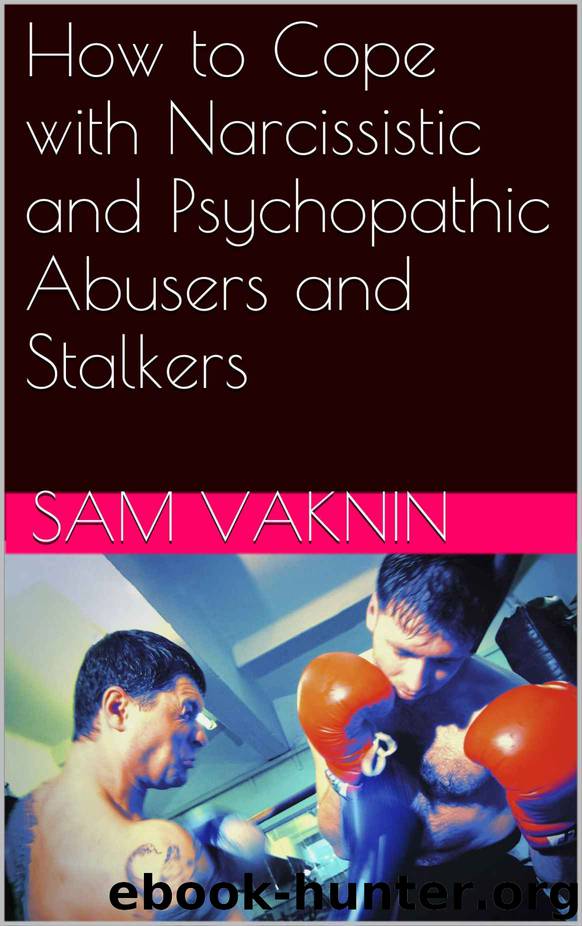How to Cope With Narcissistic and Psychopathic Abusers and Stalkers by Sam Vaknin

Author:Sam Vaknin [Vaknin, Sam]
Language: eng
Format: epub
Publisher: Narcissus Publications
Published: 2014-04-30T00:00:00+00:00
Try to maximise the number of times that "…his walls are down", that you "…find him totally fascinating and everything I desire". What makes him be and behave this way? Is it something that you say or do? Is it preceded by events of a specific nature? Is there anything you can do to make him behave this way more often?
Remember, though:
Sometimes we mistake guilt and self-assumed blame for love.
Committing suicide for someone else's sake is not love.
Sacrificing yourself for someone else is not love.
It is domination, codependence, and counter-dependence.
You control your narcissist by giving, as much as he controls you through his pathology.
Your unconditional generosity sometimes prevents him from facing his True Self and thus healing.
It is impossible to have a relationship with a narcissist that is meaningful to the narcissist.
It is, of course, possible to have a relationship with a narcissist that is meaningful to you (see FAQ 66).
You modify your behaviour in order to secure the narcissist's continuing love, not in order to be abandoned.
This is the root of the perniciousness of this phenomenon:
The narcissist is a meaningful, crucially significant figure ("object") in the inverted narcissist's life.
This is the narcissist's leverage over the inverted narcissist. And since the inverted narcissist is usually very young when making the adaptation to the narcissist – it all boils down to fear of abandonment and death in the absence of care and sustenance.
The inverted narcissist's accommodation of the narcissist is as much a wish to gratify one's narcissist (parent) as the sheer terror of forever withholding gratification from one's self.
The Need to be Hopeful
Click HERE to Watch the Video
I understand the need to be hopeful.
There are gradations of narcissism. In my writings I am referring to the extreme and ultimate form of narcissism, the Narcissistic Personality Disorder (NPD). The prognosis for those merely with narcissistic traits or a narcissistic style is far better than the healing prospects of a full-fledged narcissist.
We often confuse shame with guilt.
Narcissists feel shameful when confronted with a failure. They feel (narcissistically) injured. Their omnipotence is threatened, their sense of perfection and uniqueness is questioned. They are enraged, engulfed by self-reprimand, self-loathing and internalised violent urges.
The narcissist punishes himself for failing to be God – not for mistreating others.
The narcissist makes an effort to communicate his pain and shame in order to elicit the Narcissistic Supply he needs to restore and regulate his failing sense of self-worth. In doing so, the narcissist resorts to the human vocabulary of empathy. The narcissist will say anything to obtain Narcissistic Supply. It is a manipulative ploy – not a confession of real emotions or an authentic description of internal dynamics.
Yes, the narcissist is a child – but a very young one.
Yes, he can tell right from wrong – but is indifferent to both.
Yes, a process of "re-parenting" (what Kohut called a "self-object") is required to foster growth and maturation. In the best of cases, it takes years and the prognosis is dismal.
Yes, some narcissists make it. And their mates or spouses or children or colleagues or lovers rejoice.
Download
This site does not store any files on its server. We only index and link to content provided by other sites. Please contact the content providers to delete copyright contents if any and email us, we'll remove relevant links or contents immediately.
| Codependency | Conflict Management |
| Dating | Divorce |
| Friendship | Interpersonal Relations |
| Love & Loss | Love & Romance |
| Marriage | Mate Seeking |
The 5 Love Languages: The Secret to Love That Lasts by Gary Chapman(9784)
Doing It: Let's Talk About Sex... by Hannah Witton(9275)
Should I Stay or Should I Go? by Ramani Durvasula(7652)
The Road Less Traveled by M. Scott Peck(7593)
The Lost Art of Listening by Michael P. Nichols(7489)
Daring Greatly by Brene Brown(6501)
Beartown by Fredrik Backman(5737)
We Need to Talk by Celeste Headlee(5608)
Men In Love by Nancy Friday(5232)
The Rules Do Not Apply by Ariel Levy(4957)
The State of Affairs by Esther Perel(4711)
How To Win Friends and Influence People by Dale Carnegie(4498)
Reflections Of A Man by Mr. Amari Soul(4288)
Pillow Thoughts by Courtney Peppernell(4271)
The Ethical Slut by Janet W. Hardy(4242)
Algedonic by r.h. Sin(4056)
Surrounded by Idiots by Thomas Erikson(4026)
He's Just Not That Into You by Greg Behrendt & Liz Tuccillo(3891)
I Love You But I Don't Trust You by Mira Kirshenbaum(3859)
